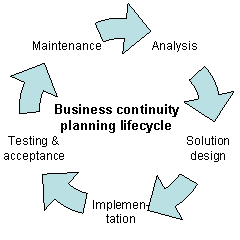Resilience, resilient, or resiliency may refer to:
Resilience, resilient, or resiliency may refer to:

Business continuity may be defined as "the capability of an organization to continue the delivery of products or services at pre-defined acceptable levels following a disruptive incident", and business continuity planning is the process of creating systems of prevention and recovery to deal with potential threats to a company. In addition to prevention, the goal is to enable ongoing operations before and during execution of disaster recovery. Business continuity is the intended outcome of proper execution of both business continuity planning and disaster recovery.
A supply network is a pattern of temporal and spatial processes carried out at facility nodes and over distribution links, which adds value for customers through the manufacturing and delivery of products. It comprises the general state of business affairs in which all kinds of material are transformed and moved between various value-added points to maximize the value added for customers. In the semiconductor industry, for example, work-in-process moves from fabrication to assembly, and then to the test house. The term "supply network" refers to the high-tech phenomenon of contract manufacturing where the brand owner does not touch the product. Instead, she coordinates with contract manufacturers and component suppliers who ship components to the brand owner. This business practice requires the brand owner to stay in touch with multiple parties or "network" at once.
Psychological resilience is the ability to cope mentally and emotionally with a crisis, or to return to pre-crisis status quickly.
Capacity or capacities may refer to:

Climate change adaptation is the process of adjusting to the effects of climate change. These can be both current or expected impacts. Adaptation aims to moderate or avoid harm for people, and is usually done alongside climate change mitigation. It also aims to exploit opportunities. Humans may also intervene to help adjustment for natural systems. There are many adaptation strategies or options. They can help manage impacts and risks to people and nature. The four types of adaptation actions are infrastructural, institutional, behavioural and nature-based options.

In ecology, resilience is the capacity of an ecosystem to respond to a perturbation or disturbance by resisting damage and subsequently recovering. Such perturbations and disturbances can include stochastic events such as fires, flooding, windstorms, insect population explosions, and human activities such as deforestation, fracking of the ground for oil extraction, pesticide sprayed in soil, and the introduction of exotic plant or animal species. Disturbances of sufficient magnitude or duration can profoundly affect an ecosystem and may force an ecosystem to reach a threshold beyond which a different regime of processes and structures predominates. When such thresholds are associated with a critical or bifurcation point, these regime shifts may also be referred to as critical transitions.
Soil resilience refers to the ability of a soil to resist or recover their healthy state in response to destabilising influences. This is a subset of a notion of environmental resilience. Soil resistance, a related term refers to the ability of soil to resist changes or the extent to which a soil will recover from any cropping or management change. The term is distinct from Soil resilience as resistance is the inherent capacity to withstand disturbance, while resilience is the capacity to recover after disturbance.

Climate Action Network - International (CAN) is a global network of over 1,300 environmental non-governmental organisations in over 130 countries working to promote government and individual action to limit human-induced climate change to ecologically sustainable levels.
A resilient control system is one that maintains state awareness and an accepted level of operational normalcy in response to disturbances, including threats of an unexpected and malicious nature".

Urban resilience has conventionally been defined as the "measurable ability of any urban system, with its inhabitants, to maintain continuity through all shocks and stresses, while positively adapting and transforming towards sustainability".
The resilience of coral reefs is the biological ability of coral reefs to recover from natural and anthropogenic disturbances such as storms and bleaching episodes. Resilience refers to the ability of biological or social systems to overcome pressures and stresses by maintaining key functions through resisting or adapting to change. Reef resistance measures how well coral reefs tolerate changes in ocean chemistry, sea level, and sea surface temperature. Reef resistance and resilience are important factors in coral reef recovery from the effects of ocean acidification. Natural reef resilience can be used as a recovery model for coral reefs and an opportunity for management in marine protected areas (MPAs).
An important part of the heritage of family resilience is the concept of individual psychological resilience which originates from work with children focusing on what helped them become resilient in the face of adversity. Individual resilience emerged primarily in the field of developmental psychopathology as scholars sought to identify the characteristics of children that allowed them to function "OK" after adversity. Individual resilience gradually moved into understanding the processes associated with overcoming adversity, then into prevention and intervention and now focuses on examining how factors at multiple levels of the system and using interdisciplinary approaches promote resilience. Resilience also has origins to the field of positive psychology. The term resilience gradually changed definitions and meanings, from a personality trait to a dynamic process of families, individuals, and communities.

The Climate and Development Knowledge Network (CDKN) works to enhance the quality of life for the poorest and most vulnerable to climate change. CDKN does this by combining research, advisory services and knowledge management in support of locally owned and managed policy processes. It works in partnership with decision-makers in the public, private and non-governmental sectors nationally, regionally and globally.

In the fields of engineering and construction, resilience is the ability to absorb or avoid damage without suffering complete failure and is an objective of design, maintenance and restoration for buildings and infrastructure, as well as communities. A more comprehensive definition is that it is the ability to respond, absorb, and adapt to, as well as recover in a disruptive event. A resilient structure/system/community is expected to be able to resist to an extreme event with minimal damages and functionality disruptions during the event; after the event, it should be able to rapidly recovery its functionality similar to or even better than the pre-event level.
Climate resilience is a concept to describe how well people or ecosystems are prepared to bounce back from certain climate hazard events. The formal definition of the term is the "capacity of social, economic and ecosystems to cope with a hazardous event or trend or disturbance". For example, climate resilience can be the ability to recover from climate-related shocks such as floods and droughts. Methods of coping include suitable responses to maintain relevant functions of societies and ecosystems. To increase climate resilience means one has to reduce the climate vulnerability of people and countries. Efforts to increase climate resilience include a range of social, economic, technological, and political strategies. They have to be implemented at all scales of society, from local community action all the way to global treaties.
Community resilience is the sustained ability of a community to use available resources to respond to, withstand, and recover from adverse situations. This allows for the adaptation and growth of a community after disaster strikes. Communities that are resilient are able to minimize any disaster, making the return to normal life as effortless as possible. By implementing a community resilience plan, a community can come together and overcome any disaster, while rebuilding physically and economically.
Cyber resilience refers to an entity's ability to continuously deliver the intended outcome, despite cyber attacks. Resilience to cyber attacks is essential to IT systems, critical infrastructure, business processes, organizations, societies, and nation-states. A related term is cyberworthiness, which is an assessment of the resilience of a system from cyber attacks. It can be applied to a range of software and hardware elements.
Resilience engineering is a subfield of safety science research that focuses on understanding how complex adaptive systems cope when encountering a surprise. The term resilience in this context refers to the capabilities that a system must possess in order to deal effectively with unanticipated events. Resilience engineering examines how systems build, sustain, degrade, and lose these capabilities.
Power resilience refers to a company's ability to adapt to power outages. Frequent outages have forced businesses to take into account the "cost of not having access to power" in addition to the traditional "cost of power". Climate-related issues have intensified the attention on energy sustainability and resilience. In the United States, electric utility firms have registered over 2500 significant power outages since 2002, with almost half of them attributed to weather events, including storms, hurricanes, and other unspecified severe weather occurrences. These incidents often lead to significant economic losses.
Resilience week is an annual symposium established to enable cross-disciplinary and role based discussions to advance strategies and research that engenders resilience in critical infrastructure systems and communities. Damaging storms, cyber attack and the interconnection of critical infrastructure systems can lead to cascading events that not only affect local but also across regions. However, many of these interdependencies are not easily recognized and obscure and complicate the mitigation of risk. The purpose of the symposia series is hence to facilitate best practice in managing critical infrastructure risks, by bringing together businesses, government and researchers.